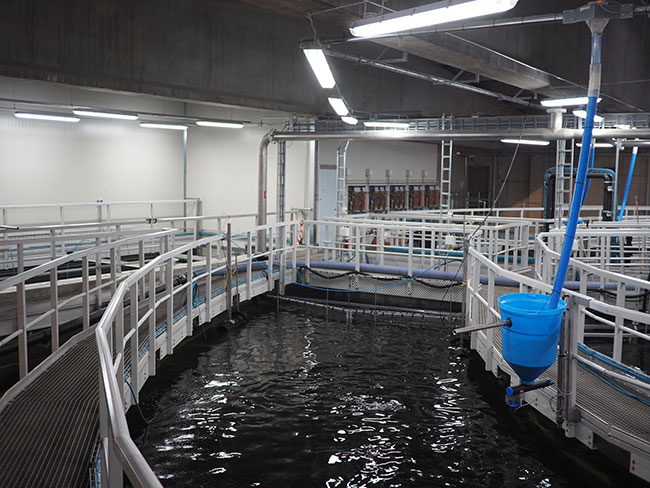
Features
Management
Feeding and Nutrition
RAS firms adapt new strategies to deal with COVID-19
April 14, 2020 By Nestor Arellano

The continuing lockdowns and other restrictions due to the COVID-19 pandemic have placed aquaculture companies around the world under extreme pressure. Rather than simply shut down, many firms are fighting back by re-evaluating their current operational procedures and adapting new approaches.
Here are a few alternative strategies which small and large-scale aquaculture companies can employ to mitigate the impact of the pandemic.
Great Falls Aquaculture operates a recirculating aquaculture system (RAS) facility in Thunder Falls, Mass. The company’s live barramundi are sold to markets in the United States and Canada. Great Falls was selling about 23,000 lbs of barramundi per week. However, early this year, their markets have all but disappeared.
Keith Wilda, Great Falls owner was quoted in the Aquaculture Alliance blog as saying that his company had some 945,000 barramundi in its tanks. Heating and feeding expenses are costing the company tens of thousands of dollars each month.
Lower tank temperature
Great Falls decided to lower the temperature in their tanks by 1.5 degrees C. The aim is to slow down fish metabolism. This in turn reduces the fish’s appetite.
Daily feed ration dropped from 2,100 kg/day to 1,600 kg. The staff is carefully grading the fish by size more regularly to prioritize their needs, and to keep as many alive as possible until the market returns.
“It’s a stop-gap measure,” he said. “We’re maintaining, not necessarily trying to grow.”
Wilda also hopes the measure will help his company cut down its RAS facility’s $35,000/month electricity and heating bill.
Switching to online technology
Aquaculture business accelerator Hatch closed an $8.4 million aquaculture investment in February.
The company will soon be launching an immersive mentoring program. With global travel restrictions, George Baunach, the firm’s co-founder, is worried about his accelerator’s next cohort.
Baunach is considering online alternatives and a switch to a remote program.
Impact on start-ups
Baunach said that startups “need to manage money a little differently” under the new realities.
He said that raising money is now more challenging and that liquidity will be more challenging in the next months and coming years.
“The pool is not as big as it was,” he said. “Early-revenue streams, rather than take a big shot, will stay leaner and grow slower. Those are the consideration.”
The RAS advantage
The current environment is revealing the importance of RAS technology, according to Wilda.
For instance, RAS facilities provide greater traceability and biosecurity over traditional aquaculture methods.
RAS provides operators better input controls.
Going back to how his company is lowering tank temperature to alter feeding habits, Wilda said: “With RAS, I’m able to do what I’m doing, manipulating the system. In a cage system, you can’t do that. I do think people will look differently (at RAS) now.”
For more, click on this link.
Print this page